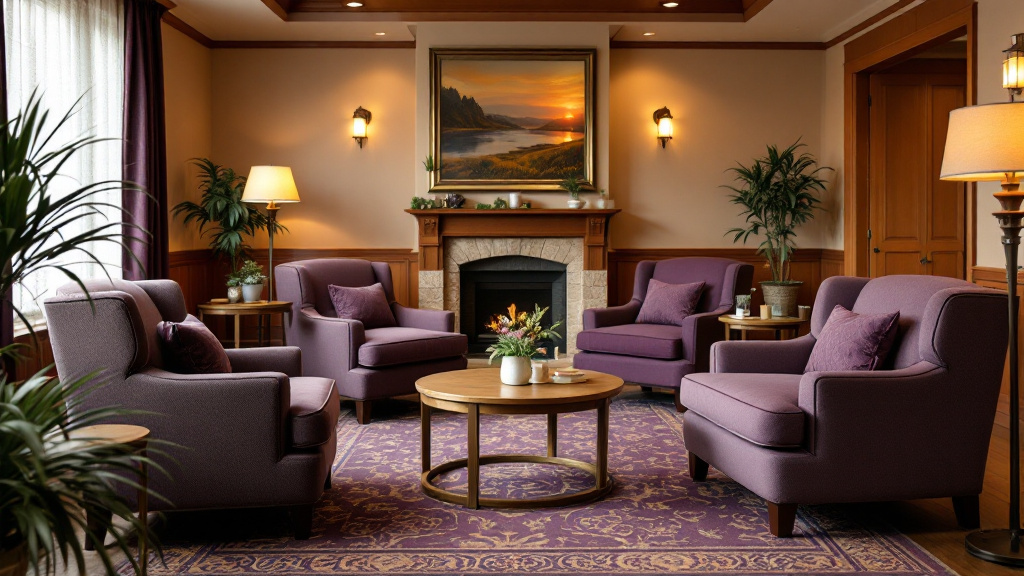Integrating Culture and Faith into Assisted Living
Assisted living facilities have recognized the profound impact that cultural and religious services have on the well-being of seniors. Such services not only enhance the emotional, spiritual, and social health of residents but also foster a sense of belonging and community within these environments. Understanding and catering to the diverse cultural and spiritual backgrounds of residents, these facilities are creating spaces where seniors can maintain their identities and continue the practices that are meaningful to them.
The Role of Cultural and Religious Services

Significance of cultural and religious services
Cultural and religious services in assisted living communities play a vital role in enriching residents' lives. They address the emotional, spiritual, and social needs of seniors, creating an inclusive environment that respects and celebrates diverse backgrounds. Such services not only reduce feelings of isolation among residents but also foster a strong sense of belonging. By honoring various cultural traditions and religious practices, communities help residents maintain connections to their heritage, enhancing their overall well-being.
Enhancing well-being and fostering community
Facilities often implement various activities to support spiritual and cultural engagement. Examples include:
- On-site worship services: Regular religious gatherings for different faiths, such as Catholic masses and Jewish Shabbat services.
- Prayer spaces: Dedicated areas for personal reflection and prayer that accommodate different religious practices.
- Cultural celebrations: Events that commemorate different traditions and festivals, fostering camaraderie among residents.
- Dietary arrangements: Meals that adhere to religious dietary laws, such as kosher or halal, which respect cultural beliefs.
By providing these services, assisted living facilities enhance residents' quality of life and satisfaction. Trained staff ensure sensitivity to residents' cultural and spiritual needs, creating a respectful and supportive environment. This emphasis on cultural and religious practices promotes mental health, combats loneliness, and enhances residents' spiritual journeys, contributing to a rich community life.
Spiritual and Religious Care: A Holistic Approach

Understanding spirituality and its role in senior care
Spirituality plays a vital role in the lives of many seniors, emphasizing a holistic approach to well-being that encompasses emotional, spiritual, and physical health. It provides them with purpose and fosters a sense of belonging, especially as they navigate the transitions that come with aging. Many residents engage in various spiritual practices, including meditation and prayer, which enhance their overall mental health and help them cope with feelings of loneliness or anxiety in assisted living settings.
Benefits of spiritual care for emotional wellness
The benefits of spiritual care extend beyond individual practices. Incorporating spiritual care in assisted living promotes emotional wellness and combats social isolation, which impacts seniors significantly. Facilitating discussions around personal beliefs, feelings, and hopes allows residents to maintain their identities and develop a supportive community. Studies have shown that spiritual engagement can lead to improved mental health outcomes and a greater quality of life, especially when residents participate in group activities where they share similar values and beliefs.
The difference between spiritual care and religious care primarily lies in their focus and inclusivity. Religious care is centered on utilizing specific religious beliefs and values to help individuals navigate challenges, often through the guidance of chaplains who respect and support their faith traditions. In contrast, spiritual care is broader and encompasses discussions about personal hopes, feelings, and beliefs regarding life's purpose, making it applicable to both religious and non-religious individuals. Additionally, spiritual care includes offering emotional support and a safe environment for expressing feelings, which may not be directly tied to any religious context. Chaplains provide both types of care, ensuring they respect individual beliefs while offering practical assistance and support when needed.
Creating Inclusive Cultural and Religious Spaces

Acknowledging Cultural Diversity
Cultural and religious services in assisted living facilities play a crucial role in addressing the emotional, spiritual, and social needs of residents. By fostering an inclusive atmosphere, these services help reduce feelings of isolation and promote a sense of belonging, essential for the overall well-being of seniors. Celebrating diversity through events and activities enables residents to embrace their heritage, enhancing both their quality of life and satisfaction. Facilities can implement customized care plans that reflect cultural preferences, offering meals that adhere to dietary restrictions and facilitating participation in traditional celebrations.
Implementing Diversity in Assisted Living Settings
Successful integration of cultural and religious services requires ongoing staff training on sensitivity and understanding of diverse backgrounds. This includes establishing clear respectful policies to ensure a compassionate environment. Furthermore, fostering family involvement in spiritual and cultural activities strengthens the community bonds. Assisted living facilities that respect and accommodate various religious practices—such as providing prayer spaces and transportation for outside services—create supportive settings.
How can the cost of cultural and religious services in assisted living vary?
The cost of cultural and religious services in assisted living can vary based on several factors, including location, amenities, and whether the facility is for-profit or nonprofit. Religious assisted living facilities may offer specialized services such as on-site worship leaders, prayer spaces, and faith-based community activities, which can influence overall costs. While the average cost of assisted living in the U.S. is around $5,350 per month, facilities emphasizing religious services often have a median price around $4,500 monthly. Many nonprofit organizations provide these services, leading to more flexible pricing structures compared to for-profit facilities. Additionally, the extent and type of religious and cultural programming available can further impact resident fees.
Personalized and Faith-Based Living Options

Incorporating Faith-Based Services
Assisted living facilities play a crucial role in meeting the emotional, social, and spiritual needs of their residents. Many of these facilities, like Westmont of Encinitas, integrate faith-based services into their daily offerings. These services include prayer meetings, meditation sessions, and access to spiritual leaders who assist residents with their unique spiritual journeys. Such personalized spiritual care not only promotes individual well-being but also creates a supportive community where residents can share their beliefs and foster connections.
Moreover, programs that celebrate various religious holidays help reinforce the sense of belonging among residents by allowing them to connect with their cultural heritage. Such engagement has shown to improve overall mental health, reduce feelings of isolation, and enhance residents' quality of life.
Faith-Based Community Amenities
Faith-based assisted living communities often provide a range of specialized amenities designed to cater to the spiritual needs of their residents. Common features include on-site chapels, organized worship services, and dedicated spaces for prayer. For instance, places like Brightview Severna Park offer activities like Bible study and group prayers, which facilitate deeper connections between residents who share similar faith backgrounds.
In addition, transportation services are typically available for residents wanting to attend religious services outside the community, ensuring they can maintain their spiritual traditions and connections. This holistic approach not only focuses on spiritual care but also emphasizes overall wellness, further enhancing the quality of life for seniors.
Evaluating Assisted Living Options and Their Cultural and Religious Accommodations
What are the three principles of assisted living?
The three principles of assisted living are person-centered care, the practice of ethics at all times, and a clear mission statement.
- Person-Centered Care: This focuses on tailoring services to meet each resident's unique needs, preferences, and abilities. It ensures that all aspects of care are personalized, promoting an individual’s dignity and autonomy.
- Ethical Practices: Family involvement and respect for residents’ diverse cultural backgrounds are crucial. Facilities must maintain transparency and integrity in all interactions, treating residents with respect and dignity.
- Clear Mission Statement: A well-defined mission guides the community’s values and goals, which enhances the environment for residents while aligning staff training accordingly.
Together, these principles foster support and respect in assisted living communities, especially concerning cultural and religious considerations.
How can I evaluate cultural and religious support in assisted living?
When selecting an assisted living facility, it is essential to evaluate their cultural and religious support systems.
- Cultural Sensitivity Training: Ensure that staff undergo training to understand and respect residents' diverse backgrounds.
- Personalized Care Plans: Look for facilities that offer care plans respecting individual cultural and religious needs, such as dietary restrictions and holiday observance.
- On-Site Worship Opportunities: Check for on-site religious services to foster spiritual engagement among residents.
- Community Engagement: Evaluate whether the community connects with local cultural and religious organizations for additional support.
- Family Involvement: The facility should encourage family participation to strengthen bonds and address personalized care.
These accommodations are crucial for promoting a sense of belonging and mitigating feelings of isolation in assisted living environments.
Embracing Diversity for Enhanced Living
Cultural and religious services in assisted living facilities play a pivotal role in the holistic care of residents. By addressing spiritual, emotional, and social needs, these services not only promote well-being but also ensure residents feel respected and included. As the landscape of senior living continues to diversify, facilities are increasingly embracing a multicultural and faith-inclusive approach that celebrates individual identities and fosters community. Understanding and choosing the right setting for loved ones can greatly influence their quality of life, ensuring they remain connected to their beliefs and cultural heritage in a supportive environment.
References
- Cultural & Spirituality in Assisted Living - Westmont Living
- How to Find Religious Assisted Living | A Place for Mom
- Spirituality & Seniors: The Power in Believing
- Embracing Different Cultures in An Assisted Living Community
- How Assisted Living Communities Support Religious and Cultural ...
- Why Spiritual Care Is Important In Assisted Living Facilities
- Cultural and Religious Considerations in Assisted Living - Medium
- Accommodating Culture, Religion, and Spirituality in Home Care




































































































